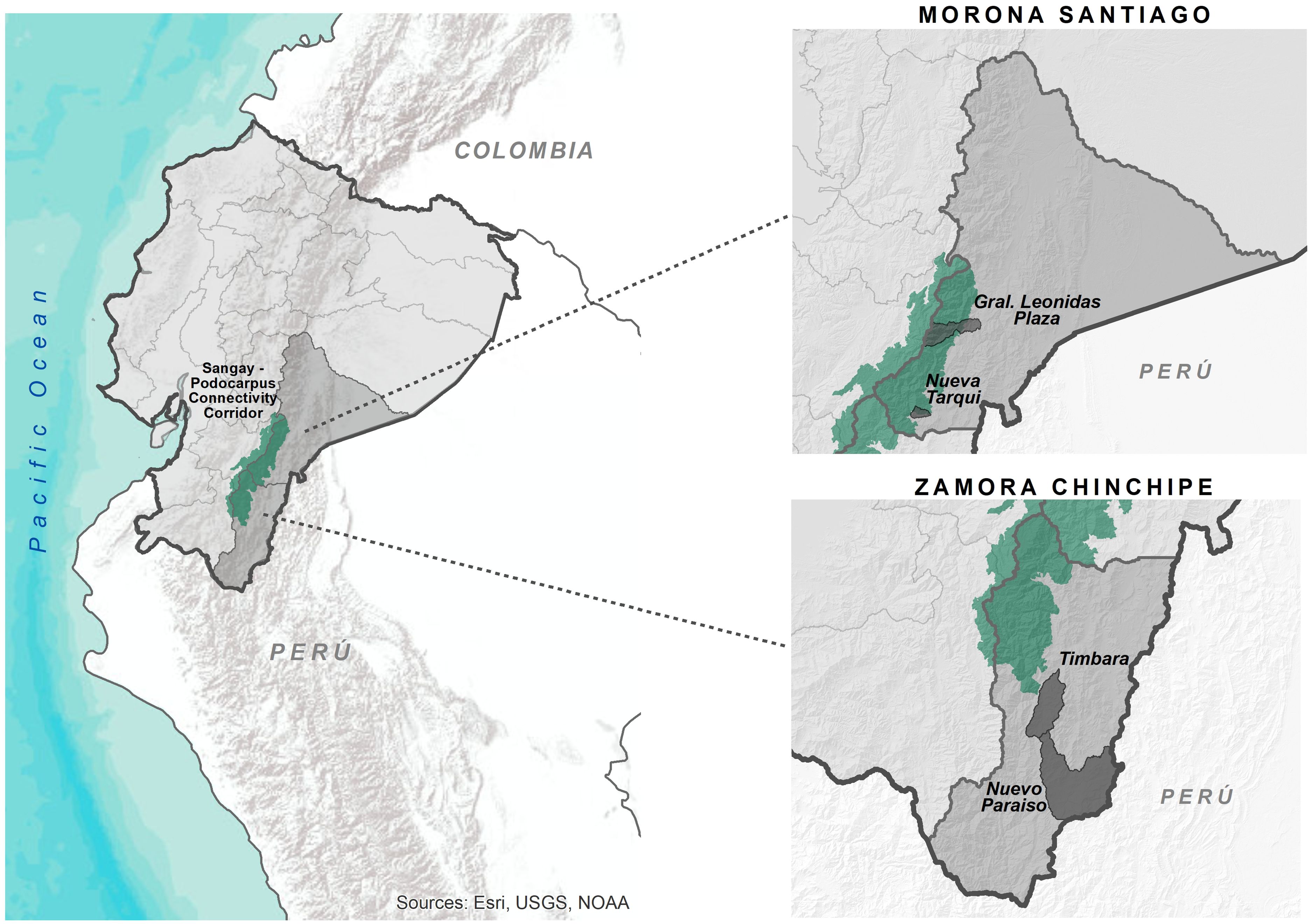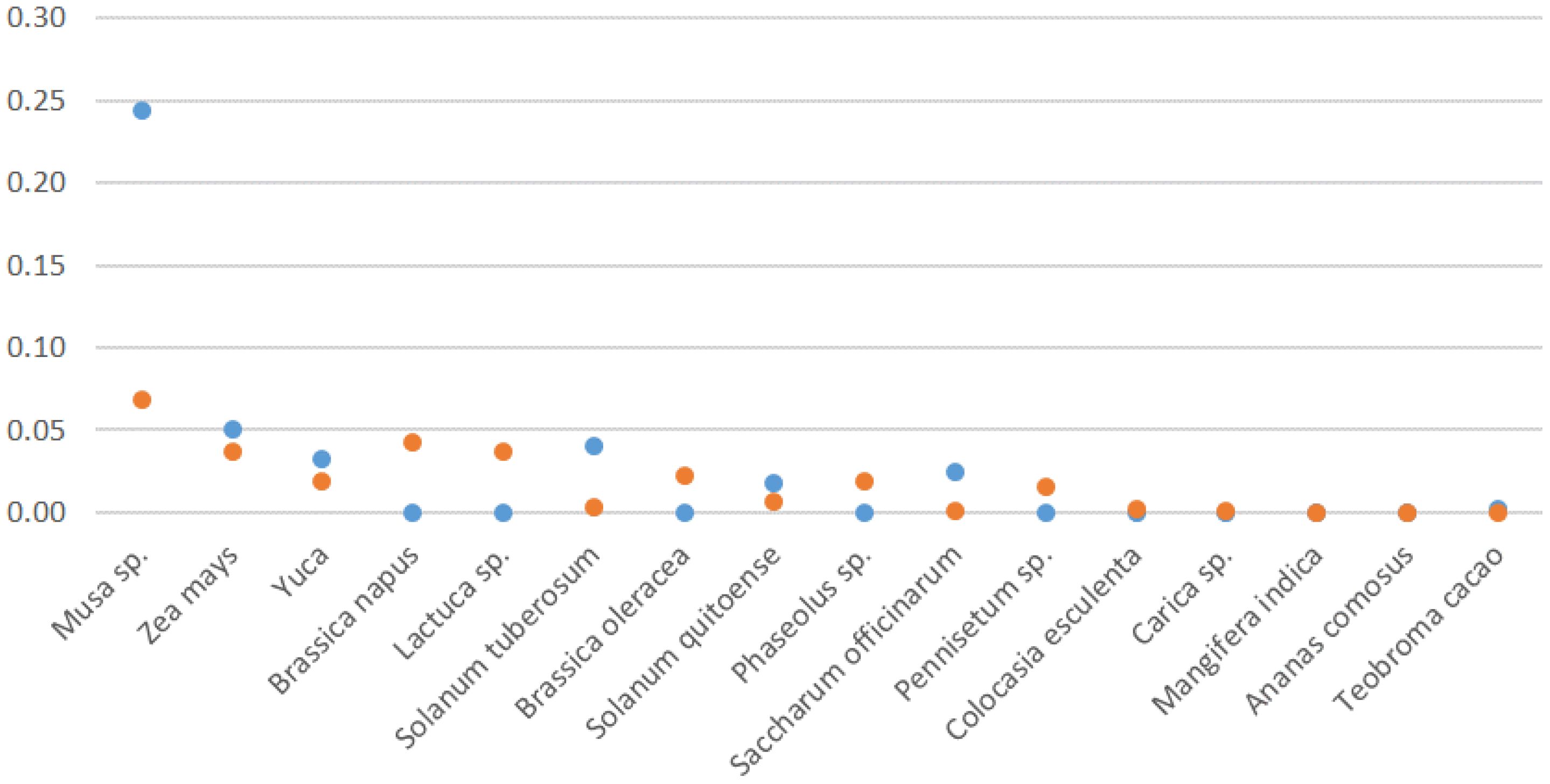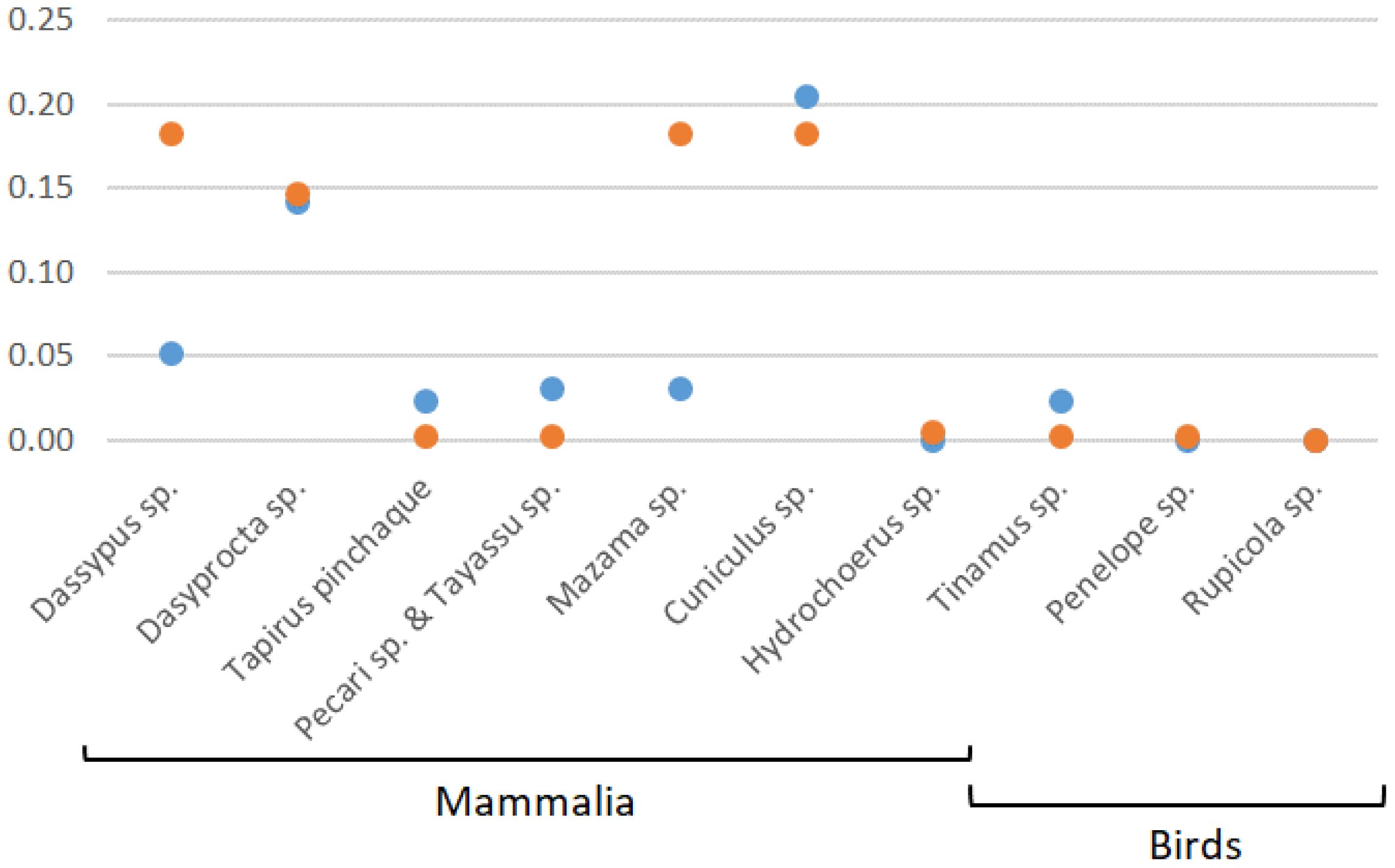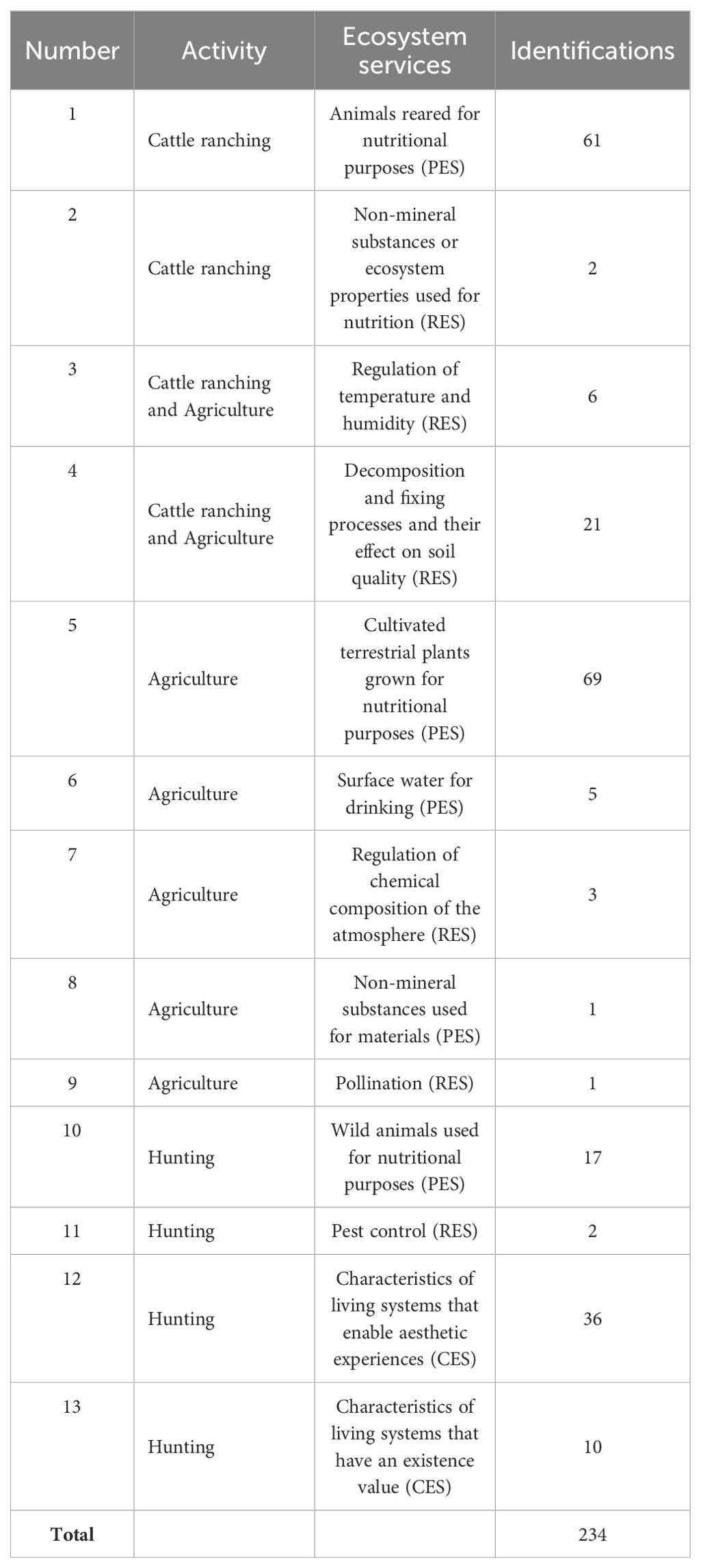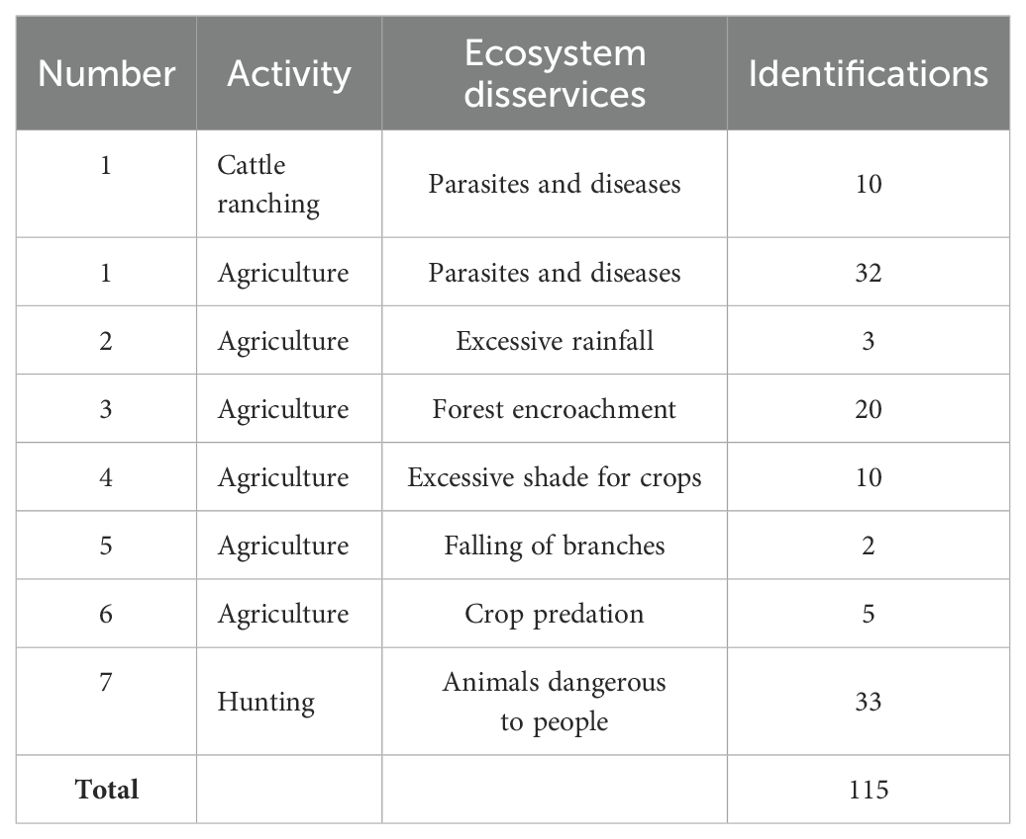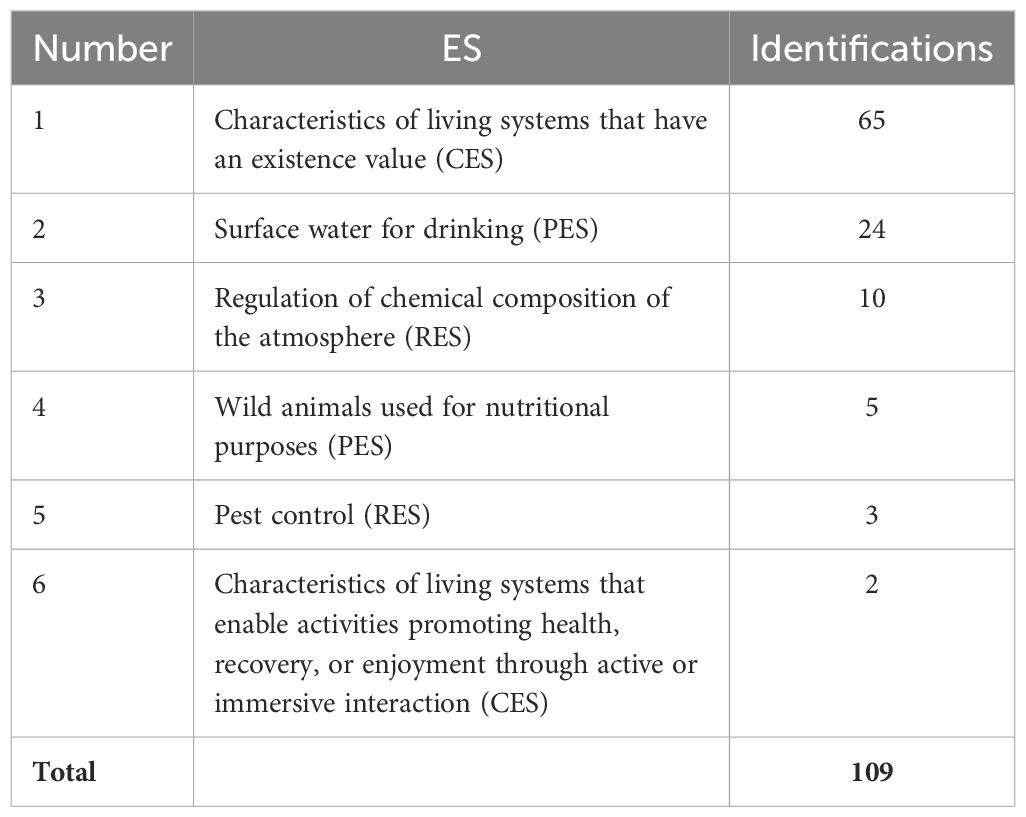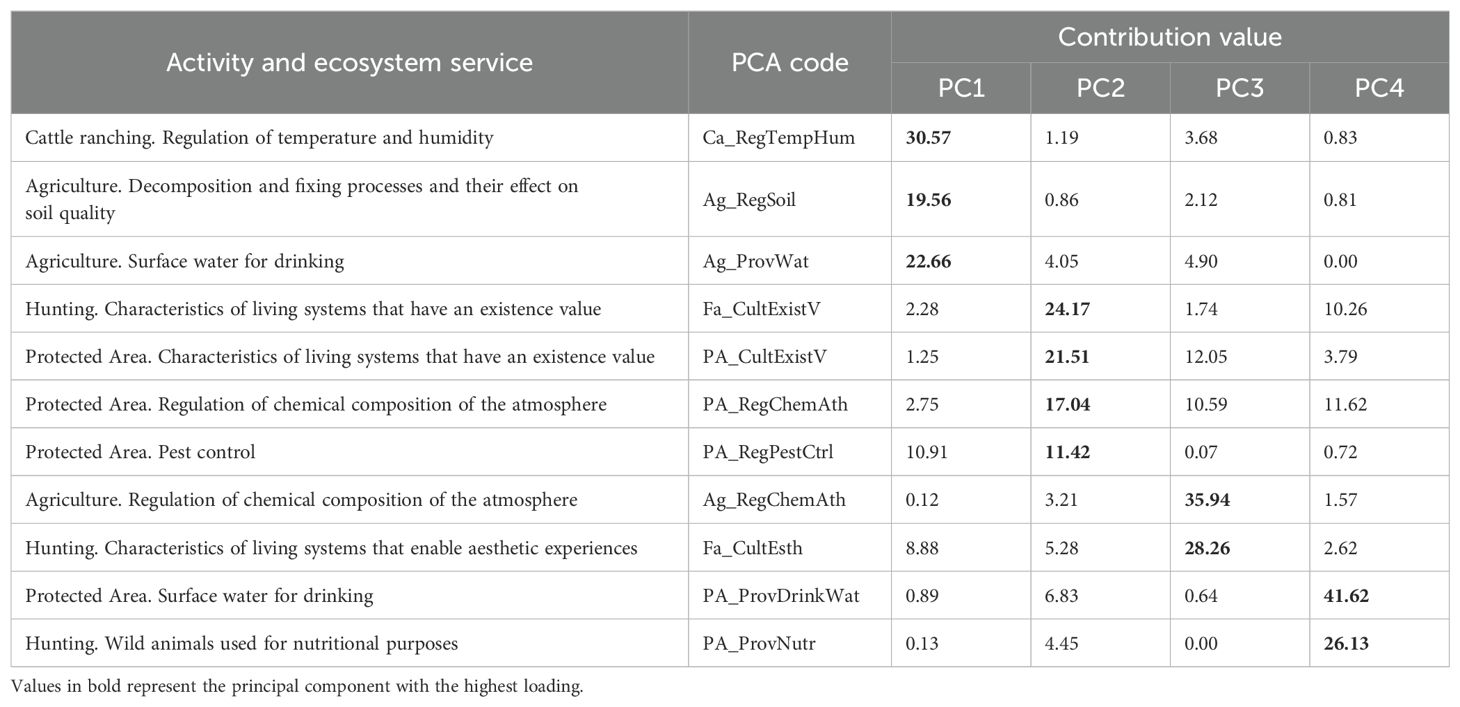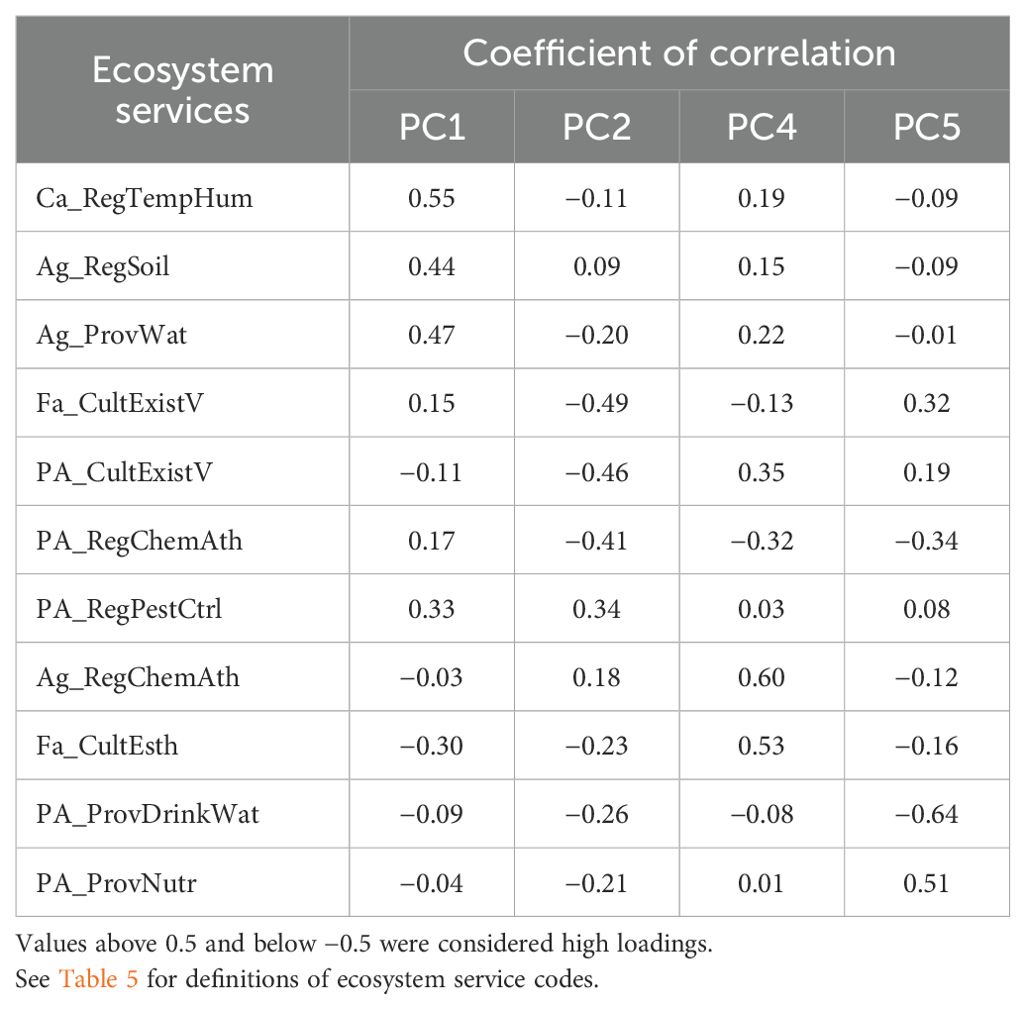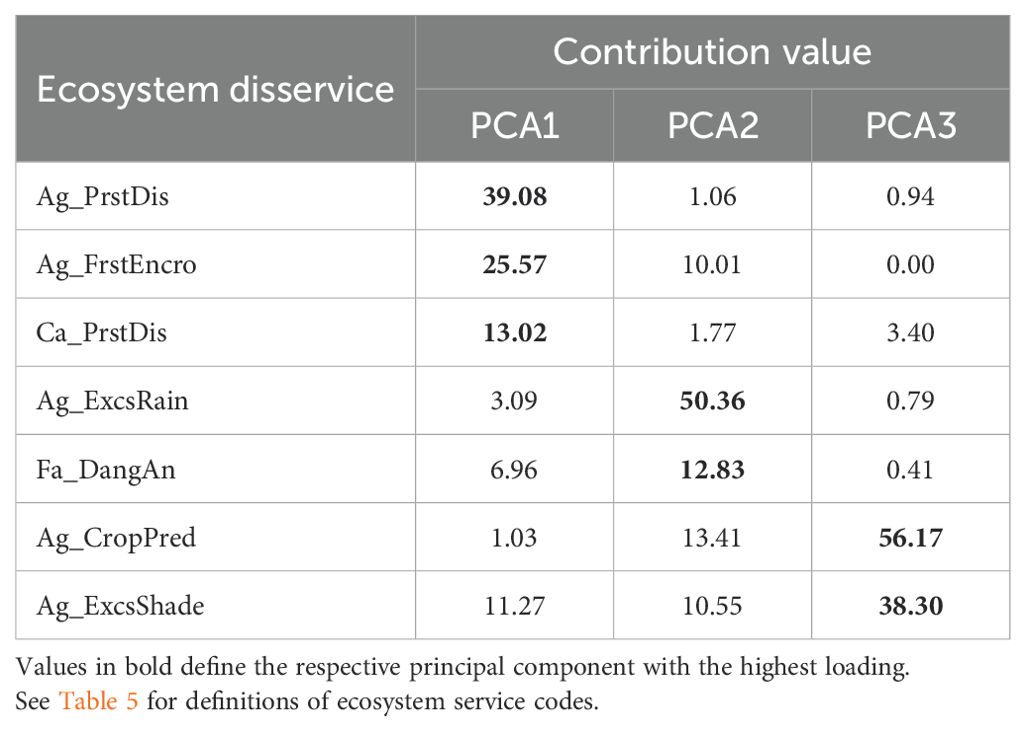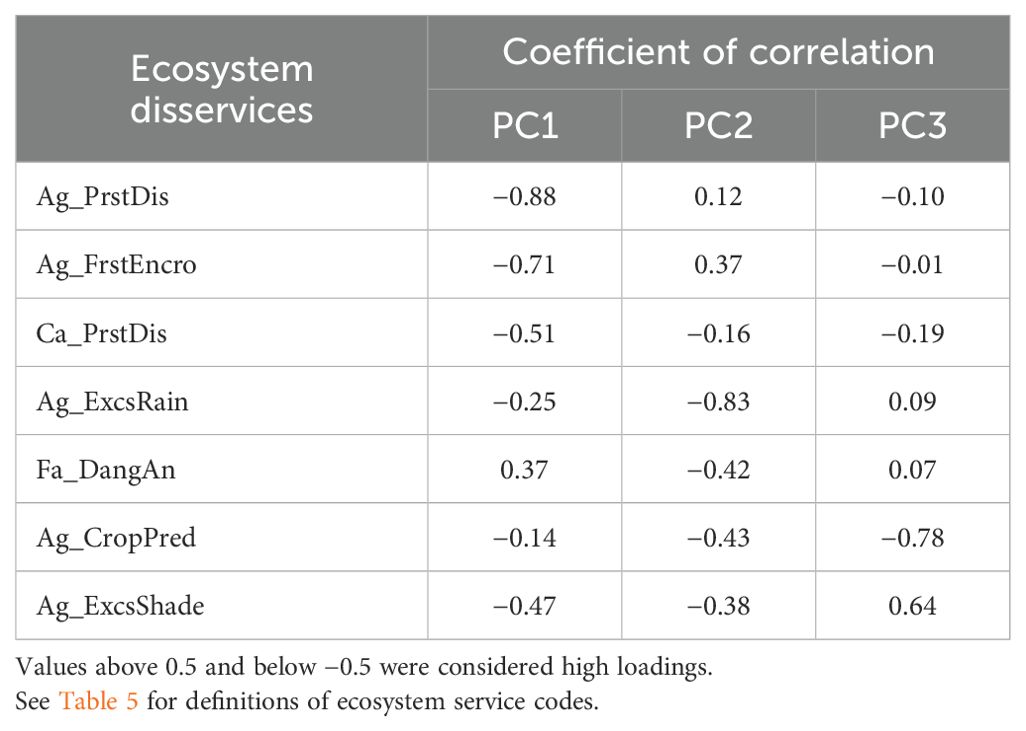- 1Facultad de Biología, Universidad Central del Ecuador, Quito, Ecuador
- 2Nature and Culture International, Loja, Ecuador
- 3Département de Biologie, Université de Sherbrooke, Sherbrooke, QC, Canada
- 4Department of Wildlife Ecology and Conservation, University of Florida, Gainesville, FL, United States
- 5Département des Science Naturelles, Université du Québec en Outaouais, Gatineau, QC, Canada
Social-ecological approaches are necessary to understand complex systems in which humans are dependent on ecosystem services to support their livelihoods. We implemented structured interviews (n=89) to characterize the social-ecological interactions between colonists and ecosystem services in four social-ecological systems located in two southern Amazonian provinces of Ecuador. This characterization allowed us to describe the subsistence activities, ecological knowledge, and local institutions present in the studied social-ecological systems. Cattle ranching, agriculture, and hunting provide safety nets to generate moderate levels of cash for colonists to face unpredictable events. However, these subsistence activities, as well as ecological knowledge and local institutions are not adapted to the local dynamic of the Amazonian ecosystems. Through this characterization of the colonists’ social-ecological interactions, we also identify the ecosystem services and disservices obtained. Thirteen ecosystem services were identified, six of which were generated within protected areas. Seven ecosystem disservices were also identified, none of them produced within protected areas. Our study shows the separation prevailing between humans and ecosystems in the social-ecological interactions of the colonists, and, at the same time, the key role of these maladapted interactions in their subsistence activities. This research contributes a qualitative strategy to assessing social-ecological interactions and illustrates the importance of the ecosystem services provided by the Amazon ecosystems to colonists.
Introduction
Social-ecological interactions between humans and ecosystems include collective and individual actions that convert ecosystem functions into either benefits or harms for human wellbeing (Hanna and Jentoft, 1996). The benefits are known as ecosystem services (MEA, 2005), and the harms, perceived or actual, generated by ecosystem functions, processes, and attributes are known as ecosystem disservices (Blanco et al., 2019). Ecosystem services and disservices can be assessed using the framework of social-ecological systems (Kotschy et al., 2015). In this study we characterize the ecosystem services and disservices obtained through social-ecological interactions between colonists and their ecosystems in four small scale social-ecological systems located in the Ecuadorian Amazon region.
Social-ecological systems (SES) are ecological systems linked with and affected by one or more social systems (Anderies et al., 2004). SES may also include protected areas whose ecological management is heavily influenced by human activities (Cumming and Allen, 2017). Traditional ecosystem assessments, at least in Ecuador, tend to focus on the establishment of protected areas, among other research activities, centered exclusively around achieving conservation goals (Wilson, 2016). However, many protected areas show poor conservation outcomes because they do not properly consider the socio-ecological interactions between humans and ecosystems (Bengtsson et al., 2021).
Berkes and Folke (2000) proposed a framework to characterize social-ecological interactions where human agency (Spangenberg et al., 2014) plays a major role, as opposed to a framing focused on resource conservation or exploitation. This human agency framework involves the analysis of subsistence practices (i.e., long-term utilization of ecosystem services through activities like cattle ranching, agriculture, or hunting) (Hunn, 1999), local ecological knowledge (i.e., knowledge about subsistence practices derived from the experience of a particular group of people) (Houde, 2007), and local institutions (i.e., rules that guide and constrain subsistence activities and ecological knowledge) (Ostrom, 1990). The research about human agency in social-ecological interactions shows that ecosystem services availability and utilization constitute a strong trade-off with rural people’s livelihoods (Berkes and Ross, 2013).
Such an approach is needed in the Ecuadorian Amazon region, a place undergoing rapid anthropogenic change where rural peoples are dependent on ecosystem services to support their livelihoods. In the Amazon, colonist social-ecological interactions, as in other Western cultures, show an epistemological discontinuity, a separation between cultures and natures (Latour, 1997). This social-ecological separation has also been documented in colonist communities throughout the entire Amazon (Morán, 1990), including Brazil (Godoy and Bawa, 1993), and Ecuador (Lu et al., 2010). In these interactions, capitalist relations governed by competition and profit emerge when nature is perceived as a commodity (Murray Li, 2014).
Through social-ecological interactions between colonists and ecosystem services, colonists obtain part of the natural capital necessary to support their livelihoods (Ruiz Agudelo et al., 2020). Yet, part of this natural capital is preserved from extensive subsistence uses and intensive exploitation in protected areas (Chapin, 2004). Consequently, the evaluations of ecosystem services in the Amazon have often been conducted at regional and global scales and have mostly included economic (TEEB, 2008) or ecological (Charity et al., 2016) values separately. Following these scales and visions, ecosystem services in the Amazon include carbon storage, maintenance of life cycles, regulation of precipitation regimes, food, and raw materials provision, water regulation, erosion prevention, forest productivity, avoidance of disease, and preservation of scenic landscapes and cultural heritage (TEEB, 2008). However, some of these ecosystem service evaluations are not necessarily linked at local scales to the subsistence needs and the livelihoods of colonists.
Ecosystem services utilization through human agency at local scales to support peoples’ livelihoods through social evaluations is less common (Spangenberg et al., 2014). Regarding the intersection between human agency and ecosystem services, two factors to consider are duration of residence and gender. The longer these households have lived in a territory, the less likely they are to clear forests because they have more secure usufruct rights to their land and thus more diverse income sources (Godoy et al., 1997). New residents must cut more forests and more intensively utilize ecosystem services to establish themselves. Regarding gender, subsistence practices among colonists in the Amazon are mostly practiced by men (Antunes et al., 2019), with women playing a fundamental role in the treatment of some ecosystem services, as well as in their distribution and circulation (e.g., the preparation, distribution and circulation of the bushmeat derived from the ecosystem service “wild animals used for nutritional purposes”, are activities mostly undertaken by women).
It is also necessary to consider that there are ecosystem disservices generated by social-ecological interactions that affect colonists’ livelihoods. Ecosystem disservices are ecosystem functions, processes, and attributes with adverse effects on human wellbeing (Blanco et al., 2019). Studying ecosystem disservices will improve our understanding of social-ecological interactions, because some stakeholders’ actions could be more influenced by the avoidance of ecosystem disservices than by the utilization of ecosystem services (Wu et al., 2021). These last authors had also provided a classification of ecosystem disservices (provisioning disservices, regulating disservices, and cultural disservices) showing that Ecosystem services and ecosystem disservices are distinct from and complementary to each other. Ecosystem disservices are more studied now than in the past; however, they are still frequently neglected (Blanco et al., 2019). Ecosystem disservices are then important factors to rural people’s livelihoods and social-ecological interactions.
Finally, it is important to note that management approaches combining a suite of habitat protection and forest use activities across regional and local scales (Rocha et al., 2020) have been implemented in the Amazon through adaptive management in protected areas and biosphere reserves (Neira Brito et al., 2022). In the Ecuadorian Amazon, protected areas and biosphere reserves are present. However, their management has not been efficiently applied due to poor coordination between local communities and the authorities of the Ministry of the Environment (Fontaine and Narváez, 2007). As a result, several conflicts have arisen due to limited access to resources for local colonists (Gerique et al., 2017). For example, in 2004 colonists living around the Sangay-Podocarpus Connectivity Corridor kidnapped a group of officials. The locals feared that their access to hunting and fishing would be prohibited due to the establishment of the Connectivity Corridor. The conflict finished after the officials agreed to conduct no further studies or workshops in the area. Therefore, it is important to investigate which ecosystem services are provided by these protected areas, the potential conflicts that produce their utilization or exclusion, and the consequences of such conflicts.
In this paper, we examine these topics in four small scale SES inhabited by colonists and located in the southern Ecuadorian Amazon. We exclusively focus on colonists because they constitute the major ethnic group in the study area, and their utilization of ecosystem services is pertinent to other Amazonian SES. Our aim is to characterize the social-ecological interactions through subsistence practices, local knowledge, and local institutions. In this context, we address two specific questions: 1) What are the characteristics of the social-ecological interactions maintained between colonists and their ecosystems? 2) What ecosystem services and ecosystem disservices can be identified through the characterization of these interactions?
To characterize the colonists’ social-ecological interactions, we used the Berkes and Folke (2000) framework focused on subsistence practices, local ecological knowledge, and local institutions. To identify the ecosystem services, we use the Common International Classification of Ecosystem Services (Haines-Young and Potschin, 2018). We discuss the implications that this integrated assessment could have for ecosystem services management in Ecuador and across similar social-ecological contexts in Latin America.
Methods
Study area
The four SES studied are found in the Ecuadorian Amazonia (Figure 1). This landscape is rich in biodiversity due to its location in the transition zone between the montane forests in the Andean foothills and the evergreen forests in the Amazonian lowlands. These two ecosystems are below 1000 m in elevation (Charity et al., 2016). The Sangay-Podocarpus Connectivity Corridor established in 2010 (567067 ha) maintains the connectivity between the Podocarpus National Park (138493 ha) that harbors 1221 plant species, 566 birds, 74 mammals, 72 amphibians, and 11 reptiles (MAE, 2014), and the Sangay National Park (517765 ha) that protects 3,000 plants species, 400 birds, 107 mammals, 90 amphibians, 26 reptiles, and 17 fish species (MAE, 2014).
Diverse colonist parishes (each consisting of several communities) are found outside these protected areas throughout a buffer zone that extends across the Sangay-Podocarpus Connectivity Corridor. We use the term colonists to refer to people who settled in a new territory (the Ecuadorian Amazon) different from that of their origin (the Ecuadorian highlands). These communities, which are not nucleated but spread out along the roads, use the ecosystem services provided by the biodiverse ecosystems of the Amazonian Andean foothills. We chose four parishes: Timbara and Nuevo Paraíso in Zamora Chinchipe province; and Nueva Tarqui and General Plaza in Morona Santiago province. We will consider each of these parishes as a social-ecological system (SES). In these SES, ecosystem services delivery and utilization, have been poorly studied.
Colonization started in the Morona-Santiago and Zamora-Chinchipe provinces in the early sixties of the last century, following agrarian reforms (Southgate and Whitaker, 2004). This colonization frontier grew and broadened, transforming the region’s biodiverse forested ecosystems into small farmlands, pastures, and urban centers that fragment the landscape (Rudel et al., 2009). The colonists’ wage-earning activities include public service officials, agricultural and livestock labor, and private employment. These jobs are temporary and generate a monthly income of 215 USD on average (Onofa et al., 2012). The average number of approved school years for these populations is seven years (INEC, 2010). Private land ownership is the formal institution that connects participants with nature.
Data gathering
We conducted one-on-one semi-structured interviews (n = 89) to collect information about the social-ecological interactions across several colonist communities in the four parishes selected, encompassing roughly 62,000 Ha. The two colonist parishes of Zamora-Chinchipe (514 inhabitants) cover some 12,000 Ha: one in the Timbara parish (29 participants) and another in the Nuevo Paraiso parish (15 participants). In Morona-Santiago, another two parishes were studied (1153 inhabitants), covering approximately 50,000 Ha in the Nueva Tarqui parish (30 participants) and General Plaza parish (15 participants). Each smallholding studied (44 in Zamora-Chinchipe and 45 in Morona-Santiago) owns 55 Ha on average. Considering the 89 farms covered and their average area, the social-ecological matrix includes approximately 4,895 ha or 8% of the total area (62,000 ha).
To choose the participants, we applied a snowball sampling approach (Gezon, 2010). In this approach primary informants (i.e., local leaders and local authorities) referred the names of secondary informants potentially involved in ecosystem services utilization. Sampling stopped when the information seemed saturated (no new information was coming in). We applied a questionnaire (see Supplementary Table S1) to adult, voluntary participants (one per farm). The first part of the questionnaire included closed-ended questions to assess the socioeconomic characteristics of each participant (age, gender, residence duration, and wage jobs). The three subsistence activities on which we focused: agriculture, hunting, and cattle ranching, were also characterized in this section. The second part of the questionnaire contained open-ended questions geared toward describing the interviewee’s knowledge of ecosystem services and the institutions’ role (Roland, 2004) associated with ecosystem service access, regulation, and utilization. The interviews were recorded with each participant’s free, informed consent to comply with the University of Sherbrooke and the University of Florida Institutional Review Boards.
Data interpretation
The importance that ecosystem services and ecosystem disservices have on influencing subsistence activities, local ecological knowledge, and local institutions was identified from the answers to closed-ended questions (yes= 1; no= 0; the name of the species used; the name of the species known), and after transcribing and coding the open-ended questions through qualitative content analysis (Hsieh and Shannon, 2005). The ecosystem services codes utilized follow the Common International Classification of Ecosystem Services (Haines-Young and Potschin, 2018). This classification is very specific, including 83 ecosystem services, which minimizes the possibility of conflating ecosystem services. The other three major classifications available (MEA, 30 SE; TEEB, 22 ecosystem services; and IPBES, 17 nature contributions to people) are less specific and could allow conflating ecosystem services. For instance, the interviewee’s answers (i.e., identifications) associated with alimentation were linked to the code “food,” which in turn relates to the ecosystem services “cultivated terrestrial plants grown for nutritional purposes.” Each identification associated with an ecosystem service was quantified based on an affirmative answer to the closed-ended questions (yes= 1). When a participant did not identify an ecosystem service, the response was quantified as a negative answer to the closed-ended questions (no= 0). Discrepancies in the answers given by participants in the different SES were not evaluated as it was assumed that they all use ecosystem services and disservices in the same social-ecological context as complements to their subsistence activities (i.e., hunting, agriculture and cattle ranching) and livelihoods.
To complete and reinforce our interpretations, we calculated some descriptive statistics like the average and standard deviation (±) for the age and the residence time for the inhabitants of each SES. We calculated Spearman’s rank correlation coefficient to evaluate the correlation between the interviewees’ duration of residence in the SES with the number of hunted species (provisioning service as food). We also calculated the percentage of the people who indicated that they knew what a protected area was and the percentage of people who stated that they thought protected areas were important. We conducted a Pearson chi-squared test to compare if people who declared knowing what a protected area is tended to name a significantly greater number of ecosystem services than those who claimed not to not know what a protected area is. To evaluate the diversity of used plants, hunted animals, and known animals by the participants in the different SES, we used the cognitive salience index (Smith and Borgatti, 1998; Sutrop, 2001), commonly used in anthropology, linguistics, and psychology, and socioecology (Chaves et al., 2019; Naves et al., 2019; Campos et al., 2021). This index considers the item’s frequency, its mean position, and the number of participants; it is free from the bias related to varying lengths of individual lists. The formula for the index is: S = F2/(N Σ Rj), where F is an item’s frequency (the number of times the species was cited by the participants), N is the total number of participants, and Rj is the average rank of the item in the list (Sutrop, 2001). This index varies between 0 and 1, where the less salient species have a value declining toward 0, and the most salient species have a value of 1.
Additionally, ecosystem services and ecosystem disservices were characterized according to the duration of residence, gender, and subsistence practices through a principal component analysis (PCA). We considered in the PCA a coefficient of correlation of >0.5 and lower than −0.5 as high loadings and we adopted a minimum eigenvalue of 1.0 to select the components (Tabachnick and Fidell, 2007). We excluded from the analyses the ecosystem services and disservices mentioned less than twice, and the ecosystem services “animals raised for nutritional purposes” (cattle ranching), “plants grown for nutritional purposes” (agriculture), and “wild animals used for nutritional purposes” (hunting). These services were identified through the closed-ended questions conducted to characterize subsistence activities. The analyses were done using FactoMineR and Factoextra packages for R version 4.4.0 (R Development Core Team, 2023).
Results
General socioeconomic conditions
All participating colonists in the four SES studied self-identified as Campesinos (peasants) with Latin-American occidental roots. The elders and those with more time living in each SES were in general immigrants from the Ecuadorian highlands (inter-Andean valleys). The mean human population density per square kilometer was 11.4 in Zamora and 7.7 in Morona (INEC, 2010). These values are roughly seven times lower than the country’s mean population density.
The participants’ ages ranged between 20 and 77 years old (X= 47 ± 15.7). Participants from Morona SES were older on average (X= 51 ± 14.9) than those from Zamora (X= 42 ± 15.6). Participant´s residence duration on each SES varied between a few months to 62 years (X= 31 ± 15.8). People from Morona SES have lived there slightly longer (X= 37 ± 16.8) than those from Zamora (X= 25 ± 12.3). These differences, which will be discussed later, could have implications for the intensity of subsistence practices, knowledge accumulation, and institutional involvement. For reference, the average salary for the entire Ecuadorian Amazon is US $215 per month (Onofa et al., 2012).
Characterization of the social-ecological interactions
The social-ecological interactions in our studied SES show a separation between colonists’ livelihoods and ecosystems (while indigenous cultural groups show continuity between their livelihoods and the ecosystems surrounding them), where capitalist relationships between them result in the transformation of ecosystems in services and commodities in ways that complement colonists’ subsistence livelihoods.
Subsistence practices
Cattle ranching was practiced by 48% of participants in Zamora (Nuevo Paraiso 13%, Timbara 65%) and by 89% in Morona (Nueva Tarqui 97%, General Plaza 70%). In the four SES studied, forests were turned into grasslands using the slash-and-burn method. The average grassland plot had roughly 3 Ha and supported up to three heads of cattle. There was no investment in qualified staff, technology, or agrochemicals to manage the grasslands or attend to the cattle. The primary purpose of maintaining grasslands was cattle ranching, although some users also owned pigs and poultry. Larger farm animals (cattle and pigs) provided safety-net support to colonists because they could be sold in times of need (e.g., health issues, unemployment, small investments in education, or expanding grasslands). Small farm animals (poultry, rabbits, guinea pigs) complemented the household food intake. Cattle ranching was practiced mostly by men (n = 46) rather than women (n = 15, G = 16.514, df = 1, p < 0.001).
Agriculture was practiced by 91% of participants in Zamora’s SES (Nuevo Paraiso 87%, Timbara 64%), while in Morona, it was practiced by 64% (Nueva Tarqui 67%, General Plaza 60%). Forest conversion into croplands was not intensive in terms of space and did not employ qualified staff, mechanized machinery, or agrochemicals. Small (0.01–0.04 Ha) crop gardens were established by clearing and burning the area. Only a few participants (two interviewees) engaged in semi/intensive agricultural practices for commercial purposes. In the present study, 16 species of crops have been registered and used for human and animal consumption in the four SES (Supplementary Table S2); 15 of these species occurred in Zamora and nine in Morona.
These crops were identified 121 times in Zamora, almost double that in Morona (66 times). Zamora province had the highest true diversity values and number of crop species identified (n=121, Richness (Q0) = 16, abundant species (Q1) = 11.47, very abundant species (Q2) = 10.09, and rare species (Q3) = 17.39); while Morona had (n=66, Richness (Q0) = 9, abundant species (Q1) = 6.48, very abundant species (Q2) = 5.31, and rare species (Q3) = 10.17). The most salient crop was the banana (Musa sp.), especially for Morona (0.024). The salient index for the rest of the crops ranged from 0 to 0.051. We found some differences in the crop preferences by province. For example, turnip (Brassica napus), lettuce (Lactuca sp.), grass (Pennisetum sp.), papaya (Carica sp.), mango (Mangifera indica) and pineapple (Ananas comosus) are not planted in Morona, while cacao (Teobroma cacao) is planted in that province but not in Zamora. See Figure 2 for salience index. Agriculture was practiced mostly by men (n = 49) and to a lesser extent by women (n = 20, G = 12.575, df = 1, p < 0.001). Residence duration in the communities was not related to the number of cultivated species.
Hunting was practiced by 27% of participants in Zamora (Nuevo Paraiso 40%, Timbara 21%) and by 11% in Morona (Nueva Tarqui 10%, General Plaza 13%). Hunted species (10) are presented in Supplementary Table S3, with four preferred species identified (Dasyprocta fuliginosa, Dasypus novemcinctus, Mazama americana, and Cuniculus paca; see Figure 3 for salience index values). Hunters used shotguns, and no trapping practices were registered. Local hunters did not use bushmeat as their main food source, but it complemented purchased groceries occasionally; neither did they sell bushmeat. Hunting was performed by both men and women in Zamora (men = 7, women = 5), and it was only practiced by men in Morona (n = 5). In the case of residence duration, only Zamora presented differences among groups; participants from Nuevo Paraiso SES consumed a higher number of wild animal species (Nuevo Paraiso: n = 3.3 per participant; Timbara: n = 0.9; Nueva Tarqui: n = 1.5; and General Plaza: n = 1.2). The number of years living in each SES was inversely related to the number of species hunted (rsp = −0.2311, p = 0.029), but when evaluating the provinces separately, this relationship was present only in Zamora (rsp = −0.3217, p = 0.033).
Traditional ecological knowledge
In the four SES studied, participants’ knowledge regarding social-ecological interactions cannot be characterized as traditional nor as local. Knowledge was forged and acquired in the Andean valleys and paramos. The colonists’ knowledge related to working the land allowed them to engage in subsistence activities in the Amazon, modifying them according to the local context. However, these modifications did not include technical innovations. That said, seventeen animal species were known but not hunted. Participants saw these species often. Some of them knew their common names and local ranges. The frequency of identifications of known but not hunted species (Supplementary Table S4) were higher in Morona (98 mentions, Richness = 13, abundant species = 10.52, very abundant species = 8.65, and rare species = 14.87) where residence duration is higher than in Zamora (71 mentions, Richness = 13, abundant species = 8.04, very abundant species = 6.07, and rare species = 14.98). The cited known animals showed low values for the salience index (Morona: 0 to 0.1209, average = 0.0163; Zamora: 0 to 0.0195, average = 0.0197). Panthera onca had a higher salience value in both provinces than other animals, but particularly in Zamora (see Figure 4). Colonists who have lived longer in the SES identified more wild animals than those residing for shorter durations.
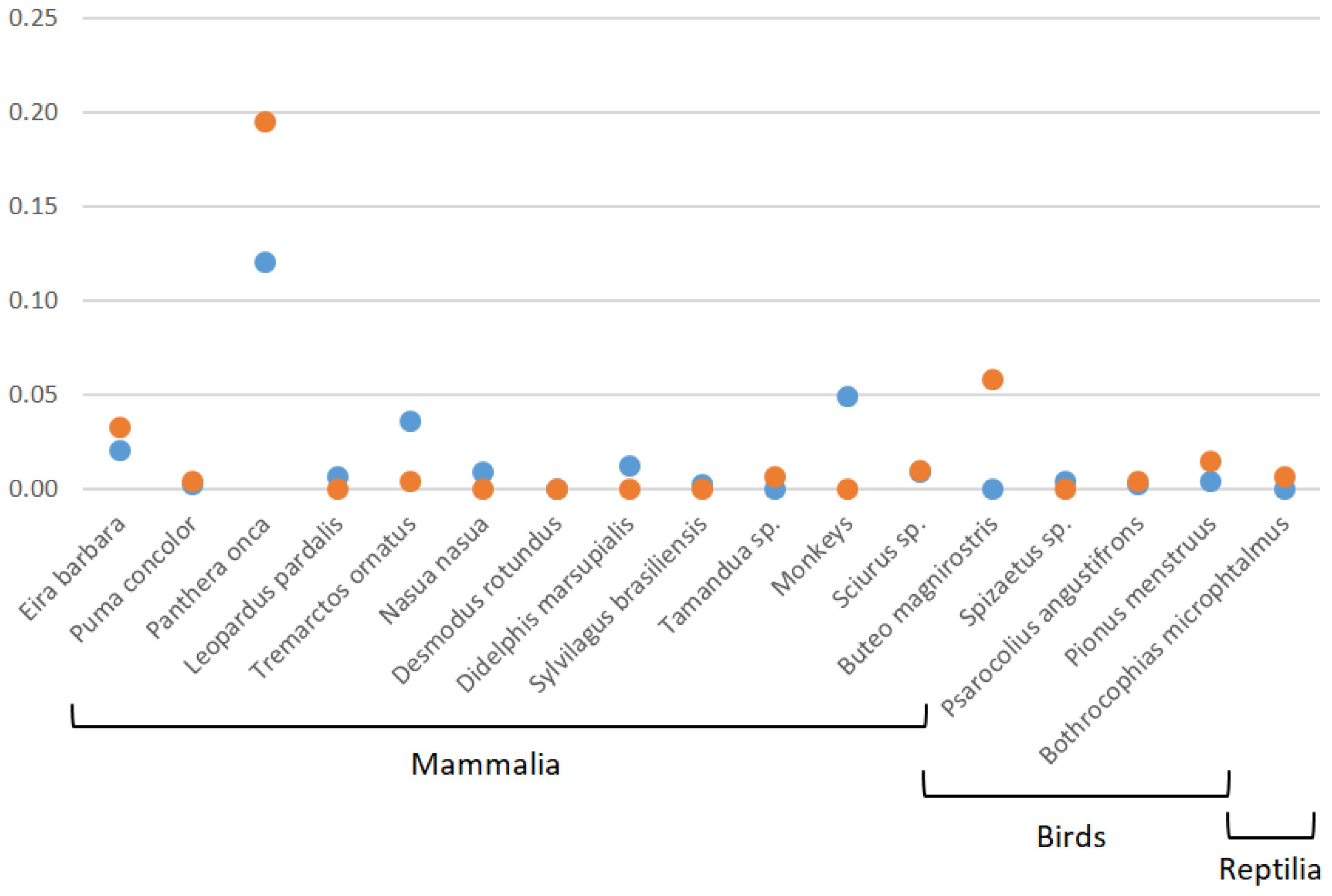
Figure 4. Salience index (S) for the known but not hunted species in Morona (blue) and Zamora (orange).
In addition, Table 1 summarizes the Hill’s true diversity values of the known but not hunted animals, of the hunted animals and of crops in the studied SES.

Table 1. Hill’s true diversity for the known but not hunted animal species, of crops and of hunted animals in Morona and Zamora provinces.
Institutions
The traditional informal institution associated with agriculture and cattle ranching practices in the four SES is the Minga, an Andean collective system of free labor and reciprocal hand-giving. This system allows working the land collectively to create grasslands and crop fields. This practice was not registered during the present study. However, other informal institutions, such as reciprocity between neighbors or redistribution between relatives, were present in the four SES.
The leading formal institution regulating and controlling agriculture, cattle ranching, and hunting activities was the Ministry of Environment, Water and Ecological Transition (hereafter, Ministry of Environment), overarching local governments with minor attributions. The most salient institutional mechanism for ecosystem protection was the Protected Areas National System. Most of the colonists in the four SES knew what a protected area was (Total = 85.4%; Morona = 93.3%; Zamora = 77.3%), and most participants, although at a lower degree, thought that protected areas were beneficial (Total = 69.5%; Morona = 84.4%; Zamora = 52.3%).
Identification of ecosystem services and ecosystem disservices
Regarding ecosystem services, the Common International Classification of Ecosystem Services includes 83 regulation, provision, and cultural services (Haines-Young and Potschin, 2018). In our four studied SES, we identified 42 as potentially available for participants, while they identified 13 (31%) of these 42 (Table 2). We also identified seven ecosystem disservices (Table 3). Agriculture was the activity most often identified as benefited and affected by ecosystem services and disservices. Ecosystem services were identified 234 times and ecosystem disservices 115 times (i.e., half of the total number of ecosystem services’ identifications). Five provision ecosystem services were identified 153 times (65.4% of the total ecosystem services’ identifications), two cultural ecosystem services were identified 46 times (19.7%), and six regulation ecosystem services were identified 35 times (15%). The most well-known ecosystem services were “cultivated terrestrial plants grown for nutritional purposes” (69 identifications) and “animals reared for nutritional purposes” (61 identifications). Both are provision ecosystem services and account for more than half of the total number of ecosystem services identified. The first 11 of the 13 ecosystem services identified reflect utilitarian value. The most well-known ecosystem disservices were “animals dangerous to people” (33 identifications) and “parasites and diseases” (32 identifications).
People who knew what protected areas were tended to name a greater number of ecosystem services (X2 = 22.95, d.f. 4, p < 0.001). But when looking at individual provinces, this remained true for Morona (X2 = 20.89, d.f. 4, p < 0.001) but not for Zamora (p > 0.05). There was a positive relationship between residence duration and both knowing what a protected area was and thinking that protected areas were beneficial. Table 4 presents the six identified ecosystem services (109 identifications) that protected areas provide to participants. These six ecosystem services are repeated from those identified through subsistence activities. The most identified ecosystem services: “Characteristics of living systems with existence value” (a cultural ecosystem services reflecting intrinsic value), corresponds to 60% of the total number of identifications. In addition, two provision ecosystem services were identified 29 times (26.6%), and two regulation ecosystem services were identified 13 times (11.9%). No potential disservices produced by protected areas were identified.
Finaly, when performing the principal component analysis (PCA), we found five components explaining 66% of the total variance and with eigenvalues higher than 1. However, when considering the contribution value of the ecosystem services to the variance, one of the components was eliminated leaving four remaining (see Table 5). The first component explains 20% of the variability and corresponds to services of regulation and provision. Those are related to people dedicated to agriculture, cattle ranching, and some of them knowing what a protected area is. The ecosystem services contributing the most in the variability of this first component were regulation of temperature and humidity (cattle ranching), decomposition and fixing processes and their effect on soil quality (agriculture), and surface water for drinking (agriculture). The second principal component explains 13% of the variance and corresponds to cultural services grouped with the ecosystem service regulation of chemical composition of the atmosphere. All the cultural services are related to hunting and knowing what a protected area is. The type of ecosystem service contributing the most in the variability of the second component was the cultural ecosystem service. The third principal component explains 12% of the total variance. The ecosystem services contributing most to the variability of this component are regulation of chemical composition of the atmosphere mentioned by people doing agriculture, and the cultural service characteristics of living systems that enable aesthetic experiences mentioned by hunters. The fourth principal component explains 9% of the total variance. The ecosystem services contributing to the variability of this third component were mentioned by people knowing the existence of protected areas. Those ecosystem services were surface water for drinking and wild animals used for nutritional purposes. Patterns of correlations among the ecosystem service types, and indicators are shown in Table 6 and appear as arrows in the biplots associated with the PCAs (Figure 5).
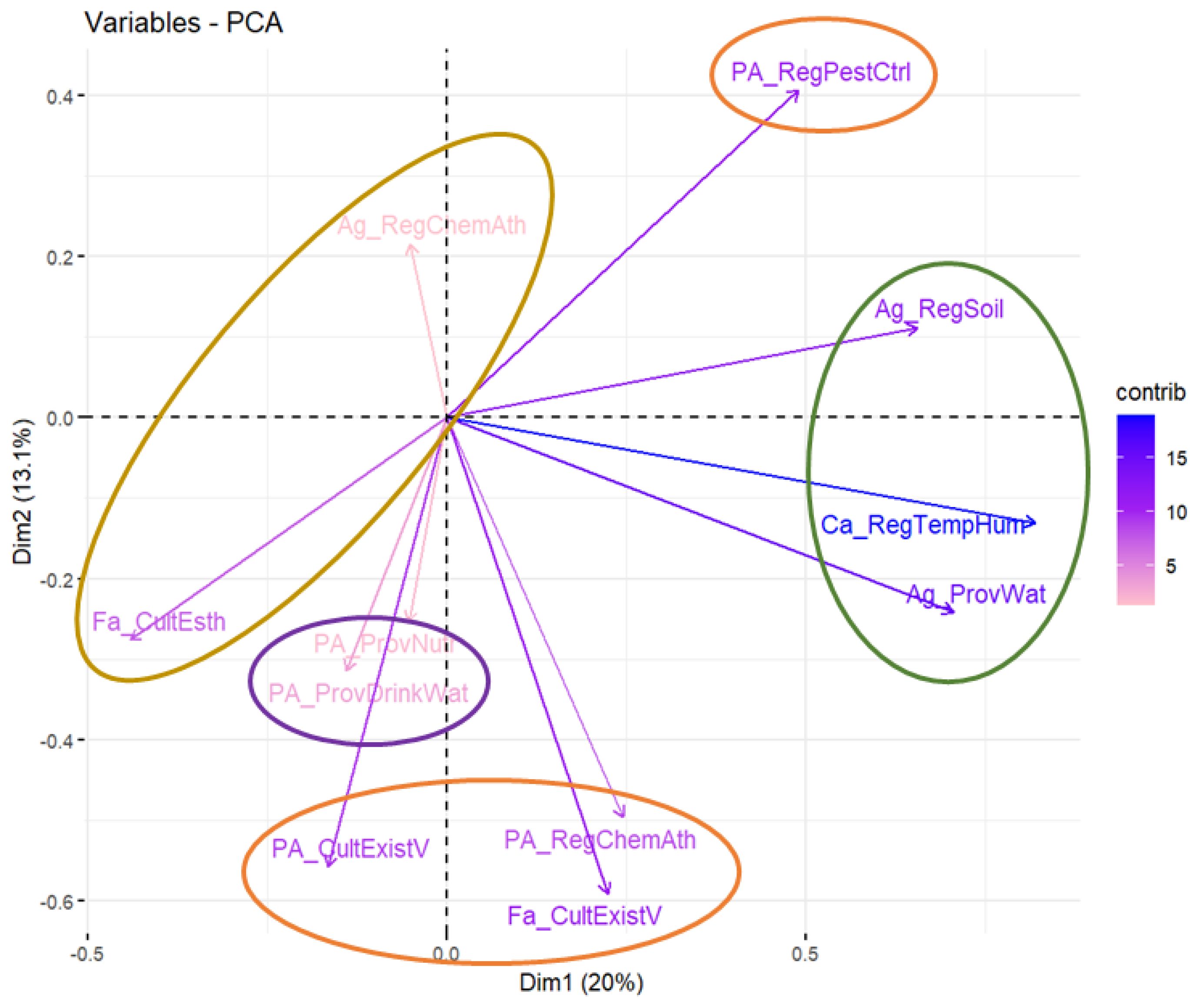
Figure 5. Ecosystem services distributed according to the Principal Component Analyses. The services contributing importantly to PC1 are in the green circle, those contributing to PC2 are in the orange circle, those contributing to PC3 in the yellow circle, and those contributing to PC4 are in the purple circle. See Table 5 for definitions of ecosystem service codes.
Regarding ecosystem disservices, we found three components explaining 63% of the total variance and with eigenvalues higher than 1 (see Table 7). The first component explains 28% of the variability. The ecosystem disservices contributing the most in the variability of this first component were parasites and diseases, and forest encroachment. Those disservices were mentioned by people dedicated to agriculture and cattle. The second principal component explains 20% of the variance. The ecosystem disservices contributing the most in the variability of the second component were the excessive rainfall and dangerous animals to people. The third principal component explains 15% of the variability and the disservices contributing the most to this component are crop predation and excessive shade for crops. Patterns of correlations among the ecosystem disservice types, and indicators are shown in Table 8 and appear as arrows in the biplots associated with the PCAs (Figure 6).
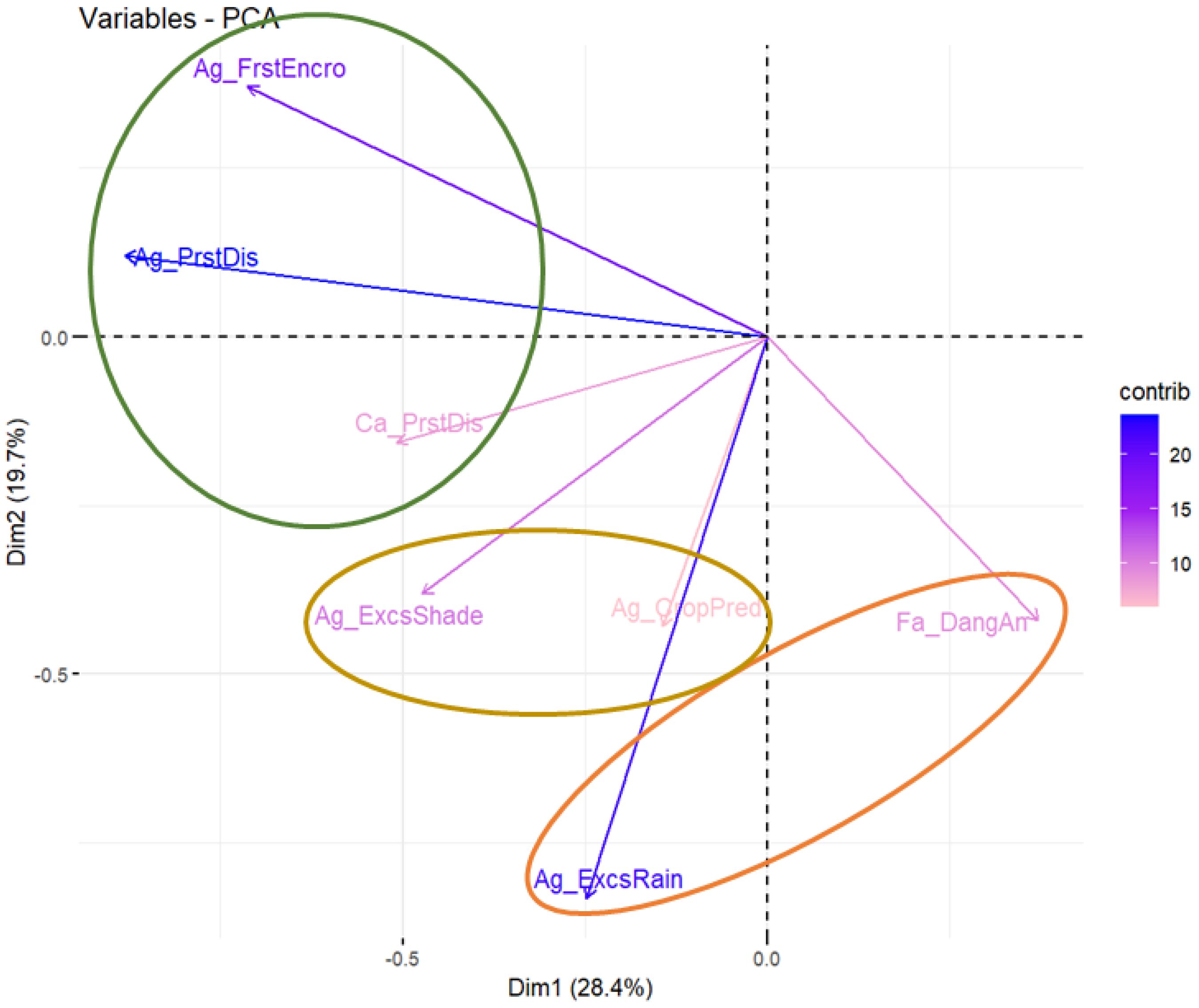
Figure 6. Ecosystem disservices distributed according to the Principal Component Analyses. Only Dimensions 1 and 2 are shown here but the disservices contributing importantly to PC1 are in the green circle, those contributing to PC2 are in the orange circle, and those contributing to PC3 in the yellow circle. See Table 5 for definitions of ecosystem service codes.
Discussion
The social-ecological interactions in our four studied social-ecological systems (SES) showed the expected separation between culture and ecosystems reported in other SES dominated by colonists in the Ecuadorian Amazon region (Lu et al., 2010). The colonists involved in these interactions have not been in the study area for more than 60 years (two generations), which would limit their adaptation to the region (Alcorn and Toledo, 2000). These new social-ecological interactions complement colonists’ livelihoods, which are primarily structured by salaried activities, as has also been reported in the Brazilian Amazon (Morán, 1993). These interactions are then of utilitarian value (i.e., economic) to our participants, and form capitalist relationships among people and ecosystems, as is also the case in other colonist-dominated SES of Ecuador, Latin America, and the world (Becker and Ghimire, 2003; Murray Li, 2014; TEEB, 2008).
Concerning subsistence practices, the first factor structuring these social-ecological interactions, cattle ranching, is the colonists’ most important activity in terms of income production (although in the frequency of practice, it is agriculture), as described for the rest of the Ecuadorian Amazon (Mejía and Pacheco, 2013). Larger farm animals generate income for small investments and social protection. Smaller farm animals complement food intake occasionally. Cattle ranching, agriculture, and hunting provide safety nets to generate moderate levels of cash to face unpredictable events, as has been reported for several countries of the Global South (Cavendish, 2003; Scott, 1976). This may also indicate the adoption of a livelihood diversification strategy by which colonists’ families construct a diverse portfolio of activities to improve their standards of living (Ellis, 1998).
Considering the other two factors structuring the social-ecological interactions: ecological knowledge and local institutions, the ecological knowledge of the colonists is neither traditional nor local. It was acquired in the highlands of Ecuador and transported mutatis mutandis to the Ecuadorian Amazon region two generations ago at most. The relatively low values of true diversity and of salience index of the known but not hunted animals reflect this poor ecological knowledge in the studied SES. This is also the case for local institutions. Informal, traditional institutions, beyond the immediate neighborhood, involving some kind of reciprocity (Scott, 1976), are not present. The leading formal institution (overarching local governments with minor attributions) present in our four studied SES is the Ministry of Environment, which is mainly concerned with ecosystem conservation. Consequently, as pointed out by Berkes and Folke (2002), one would expect there to be few institutional and ecological memories in our studied SES.
Regarding ecosystem services identification, the prevailing Andean worldviews in these Amazonian SES might explain the limited identification of ecosystem services (13 of 42), evidencing that Amazonian ecosystems continue to be relatively unknown to the participants (Lu et al., 2010). In addition, the primary identification of provisioning ecosystem services has been previously documented in the Amazon (Rodríguez et al., 2006), where the importance of provisioning ecosystem services has been linked to the short-term needs of colonists. According to these same authors, the regulating ecosystem services should follow. However, in our study, two cultural ecosystem services are second in importance to the colonists. These two cultural ecosystem services are derived from hunters, for whom this practice is linked to their peasant identity and agency (Kumar and Kumar, 2008). Even if the identification of ecosystem services is limited, the characterization of the ecosystem services through the PCA showed four differentiated clusters of services related with the socioeconomic variables measured, the subsistence activities, and the knowledge of the protected areas. For example, the knowledge of protected areas is correlated with cultural ecosystem services, while the activities of agriculture and cattle ranching are related to regulation and provision services.
The knowledge of protected areas allowed for the identification of the 6 ecosystem services mentioned at a relatively high frequency. As expected, the most frequently identified ecosystem services in protected areas were two cultural ecosystem services, expressing the intrinsic value given to ecosystems linked to Western conservation ideology (Wilson, 2016). However, two provisioning ecosystem services linked to water and food consumption (surface water for drinking and wild animals used for nutrition) were also identified, which differs from the Western conservation approach, and would rather indicate the relevance to securing the colonists’ livelihoods (Scott, 1976). Therefore, our study shows that an institutional analysis (i.e., property, reciprocity, protected areas), uncommon in traditional ecosystem services assessments, allows us to visualize other ecosystem services dimensions of importance (e.g., human agency) beyond ecosystem conservation (Hanna and Jentoft, 1996).
These assessment levels among ecosystem services availability and ecosystem services utilization constitute a trade-off with the needs of the colonists to secure their livelihoods. This trade-off between ecosystem services utilization and colonists’ livelihoods should be better considered when analyzing their utilization in the Amazon. In this context, we hypothesize that a longer residence time (i.e., better adaptation to the local SES) could be linked to a higher number of known and appropriated ecosystem services, as was also observed in Mexico (Toledo et al., 2003). Equally, sociocultural traits such as gender or ethnic identities should be considered when evaluating ecosystem services’ importance in the Amazon. In our case, hunters appear to more intensively appropriate some provisioning ecosystem services that are more in line with their sociocultural roles as providers.
We must also say that the ecosystem services tranditional ecosystem services assessment approach does not adequately consider the ecosystem disservices generated by these social-ecological interactions (Vellend, 2014). The few identified ecosystem disservices were also characterized and grouped in different clusters but there was not a clear association with subsistence activities. Still, dangerous animals and excessive rain were grouped apart from other disservices and were more related to the practices (e.g., diseases for crops and cattle, or shade and predation to crops). As stated before, the incorporation of ecosystem disservices in research about ecosystem services would improve the understanding of the Amazonian SES. An ecosystem protection perspective, which is only based on the identification of benefits, can cause bias in managerial strategies by under-evaluating or ignoring the harm that disservices can produce (Blanco et al., 2019). Moreover, the ecosystem services approach prioritizes a cascading vision (Haines-Young and Potschin, 2018), on which benefits flow from nature to humans, underestimating the role of human agency in its production and utilization (Fish et al., 2016). Thus, identifying ecosystem disservices with respect to the harms they produce to colonists’ livelihoods may be incorporated as a research goal to improve the understanding of the Amazonian SES.
It would be interesting to explore more deeply and quantitatively the likely differences between the two provinces to identify factors influencing the acceptance (or not) of the protected areas in those territories in relation to function of the cattle ranching practice. The use of forest cover Geographic Information Systems (GIS) images might have allowed us to discuss SES ecological connectivity more thoroughly. Furthermore, it was not possible to obtain ecological and socioeconomic information to describe the effects that protected areas may have on ecosystems protection and the wellbeing of surrounding human settlements. These limitations can be treated as future research perspectives for implementing an adaptive ecosystems co-management approach. Adaptive co-management accounts for both uncertainties from using the benefits that ecosystems provides to humans through their interactions (Neira Brito et al., 2022).
In conclusion, the social-ecological interactions between colonists and ecosystems show a separation between culture and nature. The social-ecological interactions characterized in this study, through subsistence activities, local knowledge, and local institutions, provide an important flow of ecosystem services that creates a safety net for the colonist populations studied, contributing to their quality of life. However, the utilization of these ecosystem services does not seem compatible, at this moment, with the strengthening of the sustainability of our four studied SES. Our approach has not been utilized in Ecuador previously and allegedly has been seldom used in the Amazon or Latin America. Overall, this research contributes a non-market strategy to assessing the importance of the ecosystem services provided by the Amazon ecosystems to colonists.
Data availability statement
The original contributions presented in the study are included in the article/Supplementary Material. Further inquiries can be directed to the corresponding authors.
Ethics statement
The studies involving humans were approved by Comité de la Recherche Lettres et Sciences Humaines de l’Université de Sherbrooke and the University of Florida institutional review board. The studies were conducted in accordance with the local legislation and institutional requirements. The participants provided their written informed consent to participate in this study.
Author contributions
FN-B: Conceptualization, Data curation, Formal analysis, Funding acquisition, Investigation, Methodology, Project administration, Resources, Supervision, Writing – original draft, Writing – review & editing. MM: Formal analysis, Investigation, Methodology, Resources, Validation, Visualization, Writing – review & editing. AA: Formal analysis, Methodology, Resources, Visualization, Writing – review & editing. VH: Conceptualization, Methodology, Supervision, Validation, Writing – review & editing.
Funding
The author(s) declare financial support was received for the research, authorship, and/or publication of this article. The first author received funding from SENESCYT (2013-AR2Q1737). The second author received funding from the University of Florida (Field Research Grant from the Tropical Conservation and Development Program (TCD) Fellowship Program at the University of Florida, and the Tinker Foundation).
Acknowledgments
Our thanks for their valuable comments, corrections, and reflections during the writing of this article go to Felipe Sánchez, Keila Yánez, José Antonio Domínguez, and Felipe Serrano. We are especially grateful to the communities and authorities of Timbara, Nuevo Paraiso, Nueva Tarqui, and General Plaza for their participation in the fieldwork.
Conflict of interest
The authors declare that the research was conducted in the absence of any commercial or financial relationships that could be construed as a potential conflict of interest.
Publisher’s note
All claims expressed in this article are solely those of the authors and do not necessarily represent those of their affiliated organizations, or those of the publisher, the editors and the reviewers. Any product that may be evaluated in this article, or claim that may be made by its manufacturer, is not guaranteed or endorsed by the publisher.
Supplementary material
The Supplementary Material for this article can be found online at: https://www.frontiersin.org/articles/10.3389/fcosc.2024.1411919/full#supplementary-material
References
Alcorn J., Toledo V. (2000). “Resilient resource management in Mexico’s forest ecosystems: the contribution of property rights,” in Linking Social and Ecological Systems: Management Practices and Social Mechanisms for Building Resilience. Eds. Berkes F., Folke C. (Cambridge University Press, Cambridge; New York), 216–249.
Anderies J., Janssen M., Ostrom E. (2004). A framework to analyze the robustness of social-ecological systems from an institutional perspective. Ecol. Soc. 9, 18. doi: 10.5751/ES-00610-090118
Antunes A. P., Rebêlo G. H., Pezzuti J. C. B., Vieira M. A. R., de M., Constantino P., et al. (2019). A conspiracy of silence: Subsistence hunting rights in the Brazilian Amazon. Land. Use Policy 84, 1–11. doi: 10.1016/j.landusepol.2019.02.045
Becker D., Ghimire K. (2003). Synergy between traditional ecological knowledge and conservation science supports forest preservation in Ecuador. Ecol. Soc. 8. doi: 10.5751/es-00582-080101
Bengtsson J., Angelstam P., Elmqvist T., Emanuelsson U., Folke C., Ihse M., et al. (2021). Reserves, resilience and dynamic landscapes 20 years later. Ambio 50, 962–966. doi: 10.1007/s13280-020-01477-8
Berkes F., Folke C. (2000). “Linking social and ecological systems for resilience and sustainability,” in Linking Social and Ecological Systems: Management Practices and Social Mechanisms for Building Resilience (Cambridge University Press, Cambridge), 1–25.
Berkes F., Folke C. (2002). “Back to the future: Ecosystem dynamics and local knowledge,” in Panarchy: understanding transformations in human and natural systems. Eds. Gunderson L., Holling C. S. (Island Press, Washington D. C), 121–146.
Berkes F., Ross H. (2013). Community resilience: toward an integrated approach. Soc. Nat. Resour. 26, 5–20. doi: 10.1080/08941920.2012.736605
Blanco J., Dendoncker N., Barnaud C., Sirami C. (2019). Ecosystem disservices matter: Towards their systematic integration within ecosystem service research and policy. Ecosyst. Serv. 36, 100913. doi: 10.1016/j.ecoser.2019.100913
Campos C. M., Moreno M. C., Cappa F. M., Ontiveros Y., Cona M. I., Torres L. (2021). Weaving” different knowledge systems through studying salience of wild animals in a dryland area of Argentina. J. Ethnobiol. 41, 292–306. doi: 10.2993/0278-0771-41.2.292
Cavendish W. (2003). How do forests support, insure and improve the livelihoods of the rural poor? A reserach note. (Bogor, Indonesia: Center for International Forestry Research).
Charity S., Dudley N., Oliveira D., Stolton S. (2016). Living Amazon Report 2016: A Regional Approach to Conservation in the Amazon (Quito, Brasilia: WWF).
Chaves L. S., Borba do Nascimento A. L., Albuquerque U. P. (2019). What matters in free listing? A probabilistic interpretation of the Salience Index. Acta Botanica Brasilica. 33, 360–369. doi: 10.1590/0102-33062018abb0330
Cumming G., Allen C. (2017). Protected areas as social-ecological systems: perspectives from resilience and social-ecological systems theory. Ecol. Appl. 27, 1709–1717. doi: 10.1111/ijlh.12426
Ellis F. (1998). Household strategies and rural livelihood diversification. J. Dev. Stud. 35, 1–38. doi: 10.1080/00220389808422553
Fish R., Church A., Winter M. (2016). Conceptualising cultural ecosystem services: A novel framework for research and critical engagement. Ecosyst. Serv. 21, 208–217. doi: 10.1016/j.ecoser.2016.09.002
Fontaine G., Narváez I. (2007). Yasuní en el siglo XXI: el estado ecuatoriano y la conservación de la Amazonía (Quito: FLACSO).
Gerique A., López M. F., Pohle P. (2017). Sitting on a ticking bomb? A political ecological analysis of conservation conflicts in the Alto Nangaritza Valley, Ecuador. J. Geographical. Soc. Berlin. 148, 134–149.
Gezon L. (2010). “Khat commodity chains in Madagascar: multi-sited ethnography at multiple scales,” in Environmental Social Sciences: Methods and Research Design. Eds. Vaccaro I., Alden Smith E., Aswani S. (Cambridge University Press, Cambridge), 238–265.
Godoy R., Bawa K. (1993). The economic value and sustainable harvest of plants and animals from the tropical forest: Assumptions, hypotheses, and methods. Econ. Bot. 47, 215–219. doi: 10.1007/BF02862287
Godoy R., O’Neill K., Groff S., Kostishack P., Cubas A., Demmer J., et al. (1997). Household determinants of deforestation by amerIndians in Honduras. World Dev. 25, 977–987. doi: 10.1016/S0305-750X(97)00007-7
Haines-Young R., Potschin M. (2018). Common International Classification of Ecosystem Services (CICES) V5.1 Guidance on the Application of the Revised Structure (Nottingham: Fabis Consulting Ltd).
Hanna S., Jentoft S. (1996). “Human use of the natural environment: an overview of social and economic dimensions,” in Rights to Nature. Ecological, Economic, Cultural, and Political Principles of Institutions for the Environment. Eds. Hanna S., Folke C., Maler K.-G. (Island Press, Washington D. C), 35–55.
Houde N. (2007). The six faces of traditional ecological knowledge: challenges and opportunities for canadian co-management arrangements. Ecol. Soc. 12. doi: 10.5751/ES-02270-120234
Hsieh H., Shannon S. (2005). Three approaches to qualitative content analysis. Qual. Health Res. 15, 1277–1288. doi: 10.1177/1049732305276687
Hunn E. (1999). “The value of subsistence for the future of the world,” in Ethnoecology: situated knowledge/located lives (The University of Arizona Press, Arizona), 2–36.
INEC. (2010). Censo de Población y Vivienda (Quito, Ecuador: Instituto Nacional de Estadística y Censos).
Kotschy K., Biggs R., Daw T., Folke C., West P. (2015). “Principle 1 - Maintain diversity and redundacy,” in Principles for building resilience. Sustaining ecosystems services in social-ecological systems (Cambridge University Press, Cambridge, London), 50–79.
Kumar M., Kumar P. (2008). Valuation of the ecosystem services: A psycho-cultural perspective. Ecol. Econ. 64, 808–819. doi: 10.1016/j.ecolecon.2007.05.008
Latour B. (1997). Nous n’avons jamais été modernes: essai d’anthropologie symétrique (Paris: Éditions la Découverte & Syros).
Lu F., Gray C., Bilsborrow R., Mena C., Erlien C., Bremner J., et al. (2010). Contrasting colonist and indigenous impacts on Amazonian forests. Conserv. Biol. 24, 881–885. doi: 10.1111/j.1523-1739.2010.01463.x
Mejía E., Pacheco P. (2013). Aprovechamiento forestal y mercados de la madera en la Amazonía Ecuatoriana (Bogo: Centro para la Investigación Forestal Internacional).
Morán E. (1990). “Ecosystem ecology in biology and anthropology,” in The ecosystem approach in anthropology. From concept to practice (Ann Arbor, MI: The University of Michigan Press), 3–40.
Morán E. (1993). La ecología humana de los pueblos de la Amazonía (México D. F: Fondo de Cultura Económica S. A de C. V).
Murray Li T. (2014). Land’s end: Capitalist relations on an indigenous frontier (Durham, London: Duke University Press).
Naves L. C., Keating J. M., Tibbitts T. L., Ruthrauff D. R. (2019). Shorebird subsistence harvest and indigenous knowledge in Alaska: Informing harvest management and engaging users in shorebird conservation. The Condor. Ornithological Applications 121, 1–19. doi: 10.1093/condor/duz023
Neira Brito F., Ribadeneira S., Erazo-Mera E., Younes N. (2022). Adaptive co-management of biodiversity in rural socio-ecological systems of Ecuador and latin-america. SSRN. Electronic. J. 8, e11883. doi: 10.2139/ssrn.4133042
Onofa M., Rodríguez F., Ponce J. (2012). Avance de los objetivos de desarrollo del milenio en la amazonia ecuatoriana (Quito: EcoCiencia).
Ostrom E. (1990). Governing the commons: the evolution of institutions for collective action (Cambridge; New York: Cambridge University Press).
R Development Core Team. (2023). R: A Language and Environment for Statistical Computing. Vienna, Austria: R Foundation for Statistical Computing. https://www.R-project.org/.
Rocha J. C., Mazzeo N., Piaggio M., Carriquiry M. (2020). Seeking sustainable pathways for land use in latin america. Ecol. Soc. 25, 1–3. doi: 10.5751/ES-11824-250317
Rodríguez J. P., Beard D., Bennett E., Cumming G., Cork S., Agard J., et al. (2006). Trade-offs across space, time, and ecosystem services. Ecol. Soc. 11. doi: 10.5751/ES-01667-110128
Roland G. (2004). Understanding institutional change: Fast-moving and slow-moving institutions. Stud. Comp. Int. Dev. 38, 109–131. doi: 10.1007/BF02686330
Rudel T., Defries R., Asner G., Laurance W. (2009). Changing drivers of deforestation and new opportunities for conservation. Conserv. Biol. 23, 1396–1405. doi: 10.1111/j.1523-1739.2009.01332.x
Ruiz Agudelo C. A., Mazzeo N., Díaz I., Barral M. P., Piñeiro G., Gadino I., et al. (2020). Land use planning in the amazon basin: Challenges from resilience thinking. Ecol. Soc. 25. doi: 10.5751/ES-11352-250108
Scott J. (1976). The moral economy of the peasant: Rebellion and subsistence in southeast Asia (New Haven: Yale University Press).
Smith J. J., Borgatti S. P. (1998). Salience Counts – And so does accuracy: Correcting and updating a measure for Free-list-Item Salience. J. Linguistic. Anthropol. 7, 208–209.
Southgate D., Whitaker M. (2004). “Los costos asociados a la expansión de la frontera agrícola en los trópicos húmedos de Ecuador,” in Antología de la economía ecuatoriana. Eds. Falconí F., Oleas J. (FLACSO - ECUADOR, Quito), 279–292.
Spangenberg J., Görg C., Truong D., Tekken V., Bustamante J., Settele J. (2014). Provision of ecosystem services is determined by human agency, not ecosystem functions. Four case studies. Int. J. Biodivers. Sci. Ecosyst. Serv. Manag. 10, 40–53. doi: 10.1080/21513732.2014.884166
Sutrop U. (2001). List task and a cognitive salience index. Field Methods 13, 263–276. doi: 10.1177/1525822X0101300303
Tabachnick B. G., Fidell L. S. (2007). Using Multivariate Statistics (Boston, MA: Pearson Education, Inc.).
TEEB. (2008). “How the TEEB framework can be applied: the amazon case,” in The Economics of Ecosystems and Biodiversity: Ecological and Economic Foundations summary (TEEB, London), 310–324.
Toledo V., Ortiz-Espejel B., Cortés L., Moguel P., de Ordoñez M. J. (2003). The multiple use of tropical forests by indigenous peoples in Mexico: A case of adaptive management. Conserv. Ecol. 7. doi: 10.5751/es-00524-070309
Vellend M. (2014). The value of biodiversity: a humbling analysis. Trends Ecol. Evol. 20, 1–2. doi: 10.1016/j.tree.2013.12.004
Keywords: social-ecological interactions, ecosystem services, Amazon, Ecuador, colonists
Citation: Neira-Brito F, Morales-Mite MA, Aguilar-Melo AR and Hull V (2024) A social-ecological approach to characterize ecosystem services in the Ecuadorian Amazon. Front. Conserv. Sci. 5:1411919. doi: 10.3389/fcosc.2024.1411919
Received: 03 April 2024; Accepted: 23 September 2024;
Published: 17 October 2024.
Edited by:
Silvio Marchini, University of Oxford, United KingdomReviewed by:
Inza Koné, Swiss Centre for Scientific Research, Côte d’IvoireJuan Carlos López-Acosta, Universidad Veracruzana, Mexico
Copyright © 2024 Neira-Brito, Morales-Mite, Aguilar-Melo and Hull. This is an open-access article distributed under the terms of the Creative Commons Attribution License (CC BY). The use, distribution or reproduction in other forums is permitted, provided the original author(s) and the copyright owner(s) are credited and that the original publication in this journal is cited, in accordance with accepted academic practice. No use, distribution or reproduction is permitted which does not comply with these terms.
*Correspondence: Francisco Neira-Brito, ZnJhbmNpc2NvLm5laXJhYnJpdG9AZ21haWwuY29t; Manuel A. Morales-Mite, bW1vcmFsZXNtQHVmbC5lZHU=
 Francisco Neira-Brito1,2,3*
Francisco Neira-Brito1,2,3* Adriana R. Aguilar-Melo
Adriana R. Aguilar-Melo Vanessa Hull
Vanessa Hull